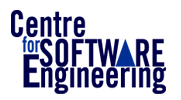
The Centre for Software Engineering has a long history of carrying out different types of assessments on many organisations in Ireland and other countries. To date, we have carried out over three hundred assessments on organisations in software and other sectors such as manufacturing, telecoms, electronics and hospitality. There are many types of assessment, with differing objectives. Invariably an assessment establishes status against a requirement or a benchmark. They can also be used to a problem or source of dispute. The result of the assessment in the form of a report and/or presentation is used to reach an objective conclusion on the target area, to arrive at a resolution, and to plan a course of action. 1. ProcessCSE has carried out many process assessments using frameworks such as CMM, CMMI 1, ISO 9001 and SPICE 2. They assess current strengths and weaknesses, potential areas of risk, establishing initial baseline of capability in order allow the organisation to measure progress over time, or it can be gap analysis against a framework which creates a benchmark. Where ISO9001 is used the assessment is described as a quality audit. Related to process assessment, an organisation may be reviewed to address role & responsibility, person & role relationships, and organisational efficiencies.s. For more information click here >> 2. Agile RiskAn Agile Risk Assessment determines how “agile” or “defined” your development process needs to be. The assessment is in two stages: the first stage looks at a number of Critical Factors that will affect your organisation’s ability to operate successfully in an agile environment; the second stage is more detailed and covers a Risk Analysis that addresses risks particularly associated with agile and traditional development. The output of the Risk Assessment of your organisation is a presentation and a report, outlining the findings of the assessment. For further details of our agile services click here >> 3. ProjectIn our project assessments we look at the processes, tools, techniques and methodologies used to manage the project. Scheduling, budgeting and tracking tools and procedures are considered as part of the assessment. Our assessment will evaluate the effectiveness of your project management tools and procedures and point out improvements (which are suitable for and sustainable in your organization) to maximise their effectiveness. We also consider how clearly defined, understood and aligned are the goals and measures of performance for the Project Manager, key project team members, and all stakeholders who have a vested interest in the project’s success. Project Assessments can be performed at the start of a project, part-way through a project or after project completion. Prior to project launch, Project Assessments may be useful to assure that critical projects are launched successfully. For projects that are not running smoothly, our Project Assessments can identify the best path to correct the project’s direction and ensure its success. Lastly, for projects that have already been completed (perhaps without complete success), our Project Assessments can identify and document important lessons learned. 4. TechnicalTechnical Assessments provide an independent judgement on the technical validity of a business plan, venture or R&D project. In our experience, organisations often underestimate development costs and schedules required to bring a new product successfully to the marketplace. Our Technical Assessment provides an objective critique of the project plan, the capacity and competence of the technical staff, the validity of the technical assumptions and the technical or other risks. Such assessments can highlight potential problems and correct oversights. Our evaluations and recommendations are based on our practical experience in managing the process ourselves. We provide such a service for start-ups, established companies in the early stage of developing a new product or service, funding agencies and programmes funded by government or other agencies. 5. ProductProduct evaluation is carried out to identify compliance against a certain standard or benchmark, or to review its effectiveness and completeness for its intended use, or its competitiveness for its intended market. CSE evaluations have included reviews to reach compliance certification, to measure its potential success in the context of investment and partnerships, and to resolve disputes. The ISO/IEC SQuaRE 3 standard for software product quality and evaluation is used in software based evaluations. Product strategies are evaluated to ensure clarity and focus of the product and market plans. A product may be valued as part of ownership transfer of its IPR, in which standard evaluation methods are employed. In dispute situations, conclusions in the evaluation may include recommendations towards resolution or framework for mediation. 6. TechnologyTechnology evaluation considers all technologies employed in a product and/or product development. The review includes the relative suitability of each technology, and the extent to which it meets standards and is supported. Our Technology Assessment service covers the following:7. Innovation CapabilityThe assessment ensures that Innovation capability is at an adequate level and identifies improvements where gaps arise in meeting the planned innovations. It considers the areas such as strategic planning, leadership, resources, innovation programme, innovation risk, evaluation of outcomes, collaboration, knowledge flow, tools and processes, infrastructure, management systems. Results provide an opportunity for improvement according to planned innovation and associated innovation capability4. 8. StrategyEvaluation may be carried out on the business strategy being adopted. It is particularly relevant to new products, and helps to achieve product and market focus. The sorts of questions we address in our assessment include:Our Strategy Assessment is delivered through meetings and workshops to present a unique, tailored service to all our clients. During the assessment, assumptions, market growth, competition, and business processes are developed and reviewed. The pragmatic focus of our approach enables our clients to see a clearer, more achievable strategy for their business. We provide such a service for start-ups, established companies in the early stage of the development of a new product or service, funding agencies and programmes funded by government or other agencies. 9. IT-CMF – IT Business Value5An executive assessment considers IT Competence under 33 core competencies at a high level. This assists an IT organisation to identify areas of improvement that increases business value of IT. A detailed assessment for one or a cluster of core competencies provides a “deep dive” view of a specific area of IT which undergoes improvement of capability, new role definition, and automation that increases its business value. NOTES:
|
Assessments
Copyright © Centre for Software Engineering
Website: Red on Green Design

